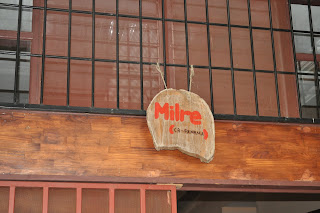So writing each day has become far more difficult than I had thought prior to arriving in Costa Rica. We are constantly doing something. We start school at 8am, have a short break at 10am in which we have snacks and reflect without using computers or phones, then finish class at 12pm. Frequently after class we have trips or visits to organizations. After these trips we usually arrive back home in the evening leaving time for dinner, homework and maybe going out.
Yesterday we went to visit Roblealto Bible Home. This is a home for children that have been abused physically, emotionally, and economically.It has operated for the last 75 years. It is a temporary home, in which they have 9 houses, which each house approximately 10 children. I think we only got pieces of what they do and not a very good explanation of the whole thing because the video they had for us had no subtitles and the couple that was showing us around has only lived there about 10 months and are from the states. I think they typically come from very poor communities in Costa Rica in which they have no running water in their house and have a great deal of crime. In each house they have a house mom and dad. The mom works in the house and takes care of the dinner and kids after school while the father works. The house mom and dad also have their own children who live with them, which means there are about 13 or 14 children in the house. They explained that many times families are referred to Roblealto or come to Roblealto asking for help. The kids usually stay there two or three years before returning to their family. While the children are there and interdisciplinary team works with the kids and the parents to change behaviors, therapy and to teach better disciplinary skills.
Every other weekend the kids go stay with their family and every other Sunday the parents come to the home to visit for a few hours and have a group or class. They kept saying that the children are able to experience "love" at Roblealto and their lives are greatly changed. They also reported having a 95% success rate and no second generation children. This success rate is measured from conversations with the child´s family, teachers and others within their social system. Many students were discussing how this can´t be very accurate but we were also thinking that it is more of an American or Western method to quantify research of programs. I assume from my experience here so far that the social workers are very connected with teachers after the child returns home but our view is that there are flaws in such a method or would be in the US.
However, they also report that once a year they have an alumni party in which adults who lived there as children return with their own children as sort of a reunion and live very different lives than if they did not receive help. When going to this facility, you must also understand that there isn´t a foster care system like we have in the states. They do put children up for adoption but more typically when they are born.
It was very interesting that they had this program and the difference of those in the US. I also heard some conversation about the implications of the woman staying home while the dad works. However, my understanding is that this is part of their culture, although many woman may stay home during the day and have jobs in the evening. But you must also keep in mind that this organization is very religious and receives a great deal of funding from international religious foundations. It sounded like it would be neat to go there for a week to volunteer (painting or building usually) in order to gain a full experience of what they do. It seemed like a pretty quick visit that we had also. Oh, I must mention the kids love visitors and interacting with others, they were very excited to show us their rooms and everything, or at least those that had cleaned their room.
I must also mention how we spend almost half of our class time discussing social problems and how they differ in both Costa Rica and the US, each day. It is great, oh we do this completely in Spanish. From what I understood, our teacher has her psychology license but therapy is not very important here, help for economic problems comes first and thus she is teaching us. Today we each had to do a little presentation on a social problem in Spanish and then discuss the differences in Costa Rica. I learn something new about the culture here everyday. It is interesting because they say they don't have their own culture as Costa Rica has taken so much from other countries but when you discuss social problems and how things are handled or viewed in Costa Rica there is so much that is distinct and different from our culture. I think the majority of the group has already experienced going to the pharmacy for an injury or illness to see a doctor, and it is much cheaper than our pharmacy.
Subscribe to:
Post Comments (Atom)



No comments:
Post a Comment